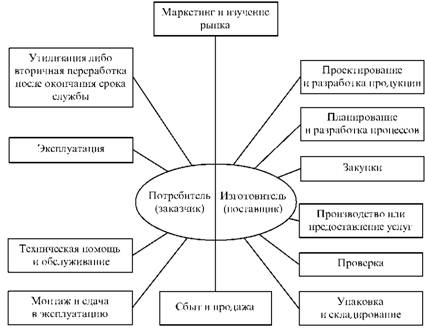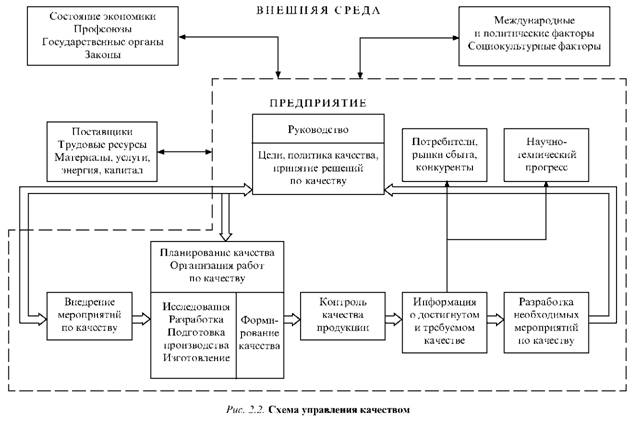home
 Management Management
 International Management - Rodchenko VV International Management - Rodchenko VV
|
International Management - Rodchenko VV
Section 2. INTERNATIONAL QUALITY SYSTEMS
2.1. Theoretical aspects of the quality management system
Quality - a set of characteristics of the object relating to its ability to meet the stated and anticipated needs. Usually, needs are translated into characteristics based on established criteria. Requirements may include, for example, aspects such as performance, functional suitability, reliability (availability, reliability, maintainability), safety, environmental impact, economic and aesthetic requirements. In many cases, needs may vary with time; This involves conducting a periodic analysis of quality requirements.
The term "quality" is not used by itself to convey the degree of superiority in a comparative sense or for technical evaluations in quantitative terms. The following terms can be used for this:
A) "relative quality" when objects are classified according to their "degree of superiority" or compared;
B) "quality level" in the quantitative sense (with statistical acceptance control);
C) "measure of quality" (for accurate technical assessments).
The quality system is the aggregate of the organizational structure, methods, processes and resources needed to implement quality management.
As a rule, the quality system affects all activities related to the quality of products, and interacts with them. It covers all stages of the life cycle of products and processes, from the definition of the needs of the market and ending with the satisfaction of requirements: a) marketing and market research;
B) product design and development;
C) process planning and development;
D) purchases;
E) production or provision of services;
E) verification;
G) packing and warehousing;
H) sale and sale;
I) installation and commissioning;
J) technical assistance and services; L) operation;
M) recycling or recycling after the end of its service life.
In Fig. 2.1 schematically represents the typical stages of the life cycle of products, provided by the international standards ISO series 9000.

Fig. 2.1. The main activities on which the quality depends
Quality management is those aspects of the overall management function that define the quality policy, objectives and responsibilities, and implement them through tools such as quality planning, operational management, its provision and improvement within the quality system. The responsibility for quality management lies at all levels of management, but it should be headed by the highest administration. All members of the organization are involved in quality management.
The object of quality management is the production process, in the course of which the quality is formed when creating products, and the subject is the quality system as a management tool.
The process of quality management is shown in Fig. 2.2.
In accordance with the goals and strategy, planning is carried out, staff motivation is carried out and the content work of the entire enterprise and its elements is organized, which are the objects of management. At the next stage, control of control objects is carried out, as a result of which information on the actual state of affairs is formed. This "internal" information is supplemented by "external" information, which allows us to compare our achievements with what is required in the external world.
As a result of such a comparison, the necessary measures are developed, which are implemented after the decision of the management, as necessary, work plans are adjusted, changes are made to the system of staff motivation.
After the implementation of the measures, control is again carried out, information is formed, new activities are developed and implemented. Thus, the control loop is repeated. If the measures taken have been selected correctly and successfully implemented, then the next management cycle is already at a higher level, thereby confirming the effectiveness of management. This process of control is "three-dimensional", and its "flat" scheme is not sufficiently clear.
The influence on the enterprise of external factors - political, legal, social, scientific and technical progress, the quality of the delivered materials, the state of the economy, etc. - can be viewed as the action of two generalizing factors: the general level of the means of production, which determines the material basis of the enterprise, and the production relations affecting on

The human factor and above all the attitude of workers towards work. The material basis of production and people with their attitude to work determine the basic conditions of the production activity of the enterprise, and therefore together they can be considered a basis of quality.
The "conductor" and the guarantor of the required level of product quality at all stages of its life cycle are informational materials under the general name of NTD - normative and technical documentation (standards, norms, production documentation, instructions, technical conditions, customer requirements, etc.).
The production of goods by entrepreneurs of any form of ownership, the processes of commodity circulation, purchase and sale, operation and disposal can not be carried out in isolation from the normative document, which regulates the requirements for the quality of goods that determine their consumer value.
To work on an equal footing with the leading firms of different countries, a unified engineering language is required, the role of which is fulfilled by international standards.
Standards - the main type of documents in the NTD. In mathematical terms, this is the sum of the production elements of the activity of any enterprise that provide a function of quality stability.
Requirements for product quality, regulated by national standards of different countries, can differ very significantly, and therefore products that do not meet the necessary quality requirements in one country can be in demand in another. It is necessary to have information about where and in which market you can get the maximum profit, and then you can easily sell the products without much hassle.
The hope that manufacturers of low-quality goods will be personally responsible for this, instills the adopted Law of Ukraine "On the zahist rights of spozhivachiv" of 12.05.91, which obliged manufacturers to confirm declarations that their products meet the requirements of NTD. In the absence of such a declaration, the Law granted the state authorities the right not to allow goods of doubtful quality to enter the market and even to revoke the patent of the manufacturer of such goods.


Comments
When commenting on, remember that the content and tone of your message can hurt the feelings of real people, show respect and tolerance to your interlocutors even if you do not share their opinion, your behavior in the conditions of freedom of expression and anonymity provided by the Internet, changes Not only virtual, but also the real world. All comments are hidden from the index, spam is controlled.